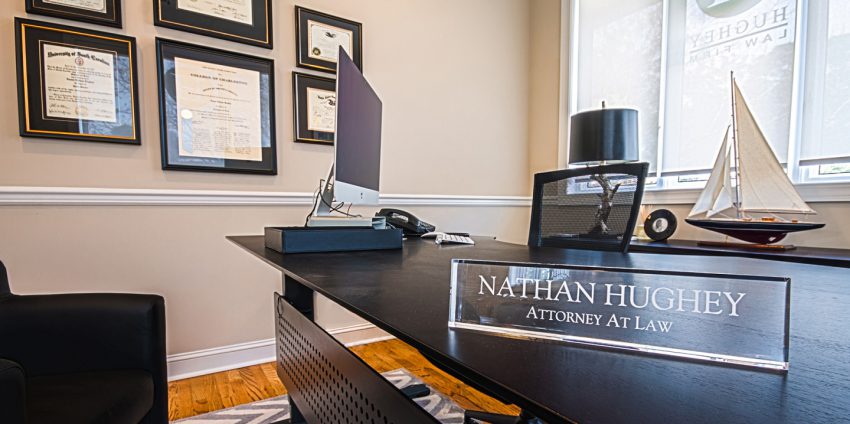Helping Victims Obtain Compensation
Personal Injury Attorneys in South Carolina
Experienced Personal Injury Attorneys
The personal injury lawyers at the Hughey Law Firm regularly take on the big insurance companies and represent injured accident victims during settlement negotiations and at jury trials.
Our experienced lawyers can aggressively advocate for you at the negotiation table or in the courtroom to help you achieve the settlement or jury verdict you deserve.
When someone acts in a reckless or careless manner and causes injury to another person, they can legally be on the line for damages. Insurance companies and their lawyers who regularly represent these individuals are not in the business of compensating you for your injuries. Instead, they will do everything they can to try and “poke holes” in your case and reduce its value.
Do I Need a Charleston Personal Injury Lawyer?
Yes. Insurance companies regularly handle injury claims, and they have tactics to convince claimants to accept much lower settlements than they deserve—or even nothing at all. This helps ensure the insurance company has maximum profits.
When you file your claim with the help of the right Charleston personal injury lawyer, however, you demonstrate to the insurer that you mean business. Our attorneys will not back down to insurance companies, and we know how to negotiate for the most favorable settlement possible. Having a lawyer also demonstrates that you will not hesitate to file a lawsuit if the insurance company insists on lowballing you. If a lawsuit does become necessary, you will have an experienced litigator ready to represent your rights in court.
While you never need a lawyer to file a claim, it is certainly highly beneficial to you, your family, and your financial recovery to do so.
On Your Side
From fine dining to amazing historical sites, Charleston is a favorite destination for more than 6,000,000 visitors annually. The Charleston metropolitan statistical area boasts a population of more than 760,000. Both the population and the number of tourists are expected to increase in the coming years.
Unfortunately, more people and more activities bring more opportunities for accidents to happen. If you are injured in an accident due to the recklessness or negligence of another person, you may pursue compensation. But when that happens, you want a law firm with the experience, resources, and results to put your mind at ease and fight the insurance companies that refuse to pay you what you need to recover.
You need the skilled, award-winning attorneys at the Hughey Law Firm.
Over the years, we’ve recovered more than $300 million for our clients. We’ve taken cases all the way to the state Supreme Court when we had to. We teach other lawyers how to fight difficult cases where they lack experience.
We’ve earned praise from our clients and other attorneys in surveys and rankings by AVVO (including a Client’s Choice award), Martindale-Hubble (including the rare Client Distinction Award), the Million Dollar Advocates Forum, and the National Trial Lawyers Association.
When you hire the Hughey Law Firm, you get local Charleston personal injury lawyers who take seriously their mission to serve our clients, the law—and our community. Over the years, Hughey Law Firm has donated hundreds of thousands of dollars and countless volunteer hours to help at-risk and disadvantaged families and children in Charleston.
Call us now to see how the Hughey Law Firm can serve you.


About Personal Injury Claims in South Carolina
South Carolina personal injury law encompasses a wide variety of accidents that can occur as a result of someone else’s carelessness or negligence. Personal injury cases may involve car and truck accidents, defective products, slip and falls, and premises liability. Each state in the nation has rules regarding the filing of personal injury claims. Here are some of the highlights of South Carolina’s personal injury statutes:- The statute of limitations for filing a personal injury claim in South Carolina is generally three years from the date of the accident.
- The state has a modified comparative negligence rule. What this means is that if you are found to be partially responsible for the accident that caused your injuries, any award you receive for your damages will be reduced by the same percentage as your fault. For example, if you were twenty percent responsible for the accident, your damage award will be reduced by twenty percent.
- If you are found to be more than fifty percent responsible for your accident, then you are not eligible to seek compensation for damages from other at-fault parties.
- The types of damages that may be awarded for a personal injury claim include economic damages such as medical bills, lost wages, and property damages; as well as non-economic damages such as pain and suffering. Additionally, punitive damages—meant to punish the defendant for reckless or negligent behavior—may be awarded.
- Punitive damages in personal injury cases are capped at three times actual damages or $500,000—whichever is greater.
- The vast majority of personal injury cases will be settled before trial. Mediation is required in South Carolina civil litigation for the purpose of encouraging a settlement.
- In South Carolina, there is strict liability for dog bite cases. What this means is that a dog owner is liable for any injury to another person by their dog, even if the dog had no previous history of aggression.
- It is possible in South Carolina to file a personal injury claim against a governmental agency or its employees if the injury you incurred was the result of recklessness or negligence on the part of an entity or individual’s lawful actions. However, if the injury occurred due to unlawful actions, then damages may be sought only from the individual whose actions were unlawful, not the governmental agency.
Our Practice Areas
Wrongful Death
Catastrophic Injuries
Slip and Fall Accidents
Product Liability
Worker’s Compensation
Nursing Home Injuries
Frequently Asked Questions
About Personal InjuriesWhat Should You Do After Suffering an Injury?
Most people do not go about their daily lives expecting an injury. Getting hurt often leaves people feeling confused and uncertain about what to do next. Knowing how to proceed after an injury can reduce stress and make it easier for you to focus on your recovery. Below are some suggestions for what to do after suffering an unexpected injury.
Common Types of Personal Injuries in Charleston
Personal injuries from accidents can range from minor cuts and bruises to fatal injuries and everywhere in between. Whether your injury required a couple of weeks of medical care or you suffered catastrophic and debilitating injuries, you will still incur losses for which you deserve to recover from liable parties.
The Hughey Law Firm works with clients with a wide range of injuries, including:
Traumatic Brain Injuries
Whether you get a concussion or a moderate to severe brain injury diagnosis, you may experience lasting effects. Even injuries diagnosed as “mild” TBIs can impact your life in many ways for months or even years to come.
Spinal Injuries
Spinal trauma can result in herniated discs and similar conditions that cause chronic back pain and require ongoing therapy or even surgery. More severe spinal injuries can damage your spinal cord itself, which can result in permanent paralysis.
Fractures
While a broken bone might not sound severe, some fractures need surgery and can cause long-term impairments and pain. Fractures can also keep you away from work and your normal activities while you recover.
Soft Tissue Injuries
Sprains, strains, and tears to your muscles, tendons, or ligaments can be painful and restrict your movement. You might need weeks or months of physical therapy to heal or surgery to repair torn soft tissue.
Neck and Back Injuries
Your neck and back support most of your body, and any injuries to your joints, soft tissue, or other parts of the neck or back can cause debilitating pain. These injuries regularly keep victims from working and require a lengthy course of treatment.
Amputations
Amputations are highly traumatizing injuries, as you lose a part of your body that you will not recover. You will need treatment for pain management and infection prevention, and you will need to learn how to function in your everyday life without the use of that body part.
Burn Injuries
Serious burns should always get immediate medical attention to prevent infections and other complications. Many patients need long stays in burn centers and multiple surgeries to try to repair damaged tissue. Even so, burn victims can have permanent impairments, scarring, and disfigurement.
Internal Injuries
You cannot see some of the most life-threatening injuries with the naked eye. Internal hemorrhaging or organ damage can kill people who do not receive the necessary emergency trauma care.
No matter what type of injury you sustained in your accident, the at-fault party should cover your medical expenses and other losses, and we are ready to stand up for your rights and the damages you deserve.
Seek Medical Attention
Any time you have an accident with injuries, no matter how minor, seek medical attention as soon as possible. In many cases it’s obvious when you need care. Sometimes, however, your injuries may appear minor at the time of the accident, then turn out more severe later. Traumatic brain injury, whiplash, and internal bleeding all fall into this latter category.
Seeking medical attention can help prevent you from injuring yourself further and provide evidence that your injuries came from the accident, not from some other event.
Keep copies of the documentation you receive from medical professionals about your injury. If possible, take photos of your injuries throughout the healing process, too. Carefully preserving this information could help you protect your rights down the road.
Contact Your Insurance Company
Your insurance company can often provide vital help and coverage as you recover from your injuries, but often you have a legal obligation to alert your insurer to your injury as soon as practicable. Calling your insurance company will inform you about what expenses your insurance company will cover and what other benefits your policy may provide. Be prepared, however, for your insurer to ask for detailed documentation about your injury, including how it happened, whether someone else is at fault, and what your prognosis is for recovery.
Contact Your Employer
After an injury, will you be able to work? How long will you need to recover before returning to work? As soon as possible, you contact your employer and ask several vital questions, including:
How much paid time off do you have? You may need to use both sick time and vacation time if your injuries require a long time off work. Conversely, your employer may have a policy that requires you to use only your sick time.
Do you have the option to work from home during your recovery? Even if you cannot go back to the office, you may complete some of your work responsibilities from home during your recovery. This can save your income and your sick time, allowing you to use your days off only for the days you really need them.
Can your workplace make accommodations to bring you back sooner? Some offices may already have accommodations in place, including shorter working hours or special seating, that can allow you to return to work sooner after your accident.
Even if your employer cannot make accommodations for you, they still need to know about your injuries and get a better idea of how long it will take you to return to work after your accident.
Take Stock of Your Finances
You have talked to your employer and your insurance provider. You have a good idea of the scope of your injuries. Now, take a look at your financial situation. If your full income will continue during your convalescence, that is a lucky thing. Most people, however, will find their income reduced by their recovery. Ask yourself the following questions to assess your financial capacity.
Do you have short or long-term disability insurance? Either type of insurance can provide a financial cushion while you recover. Make sure you check your policy to discover how much it will cover, both in terms of how much it will pay out and when the policy will kick in and provide payment.
Do you have a savings cushion that will help cover your bills? Take a look at your savings account versus your monthly bills. Make sure you have arrangements in place to help cover your regular bills.
Do you have debts that you can put on hold while you recover? Student loan services, for example, may allow you to defer payments until income increases again with little penalty other than accumulated interest.
Are there places you can get help if you need it? Take a look at local churches and food pantries. Talk with family members. You may need financial help during your recovery, and setting those arrangements up early can prevent stress in the future.
Contact a Lawyer
The sooner you contact a lawyer, the better your chances a lawyer can help you tackle the challenges of recovering from an injury. An experienced personal injury attorney can help by:
- Investigating whether you have a claim against another party. By working with a lawyer, you can identify who caused your injuries and whether you have the right to financial compensation from them. An experienced personal injury lawyer knows how to conduct an investigation that evaluates all potential avenues for obtaining compensation from parties with legal liability.
- Negotiating on your behalf. Many people find working with insurance companies both exhausting and frustrating. An experienced personal injury lawyer, however, will negotiate on your behalf, freeing you up to focus on the healing process. A lawyer will also have your best interests at heart, and will fight to recover the compensation you deserve.
- Providing valuable legal advice. There are legal pitfalls to avoid while you recover from an injury. A lawyer can guide you around them. These may include deciding what you should post on social media about your injury, analyzing the terms of a settlement offer, and sketching out a plan for making the most of your legal rights.
Maximizing the compensation you receive. From discovering more information about the insurance policy that covers your accident to working with you to identify all individuals and entities who bear responsibility in your accident, an attorney’s efforts give you the best chance of maximizing the compensation you receive from your accident.
Elements of Proof in a Personal Injury Case
In order to prove negligence in a personal injury case, the accident victim must be able to demonstrate four legal elements.
Available Damages
Common Damages in Personal Injury Claims
A natural question from clients is how much they can expect to receive from a successful claim. While it would be nice to provide an answer immediately, we would first need to evaluate the damages in your specific situation.
However, depending on your circumstances, some common damages that you might include in personal injury claims are:
Medical bills
Medical expenses are the first type of damages you might think to include in your personal injury claim, though you must consider all of your expenses related to your medical care.
These can include:
- All of your expenses right after the injury, including ambulance transportation, diagnosis and trauma care in the emergency room, or an initial visit to urgent care
- All costs associated with admission to the hospital, intensive care unit (ICU), a burn center, or another specialized care facility
- Surgical costs and related hospital stays
- Medications
- Specialist and follow-up appointments
- Inpatient or outpatient rehabilitative therapy
- Occupational therapy
- Medical equipment or devices
- Home health care
- Long-term care stemming from the injury
You should also consider mileage or childcare costs due to doctor’s appointments and other incidental expenses. If your medical care will extend beyond your injury claim’s resolution, you also must determine and seek the estimated costs of your future treatment. Our team can utilize medical experts to know the accurate value to seek for future medical-related losses.
Lost Earnings
In many cases, injury victims must miss work due to treatment, doctor’s orders, or restrictions created by the injury. If you have to take leave from work, you can recover for all the wages you lost. If you cannot return to your previous job and need to switch to a lower-paying position or less-fulfilling career path, we can use our network of experts to calculate your future lost earning abilities to include in your damages.
Non-economic Losses
Not all damages stem directly from monetary losses, as many injury victims recover compensation for non-economic losses, which are intangible.
This does not mean you can’t seek financial recovery for these damages, however, as our attorneys know how to calculate the value of:
- Physical pain and suffering
- Emotional and mental trauma
- Loss of enjoyment of life
- Permanent impairments, disabilities, or disfigurement
- Loss of consortium
You want to request the full value of your claim from the start to ensure you don’t miss out on any compensation that you need and deserve.


